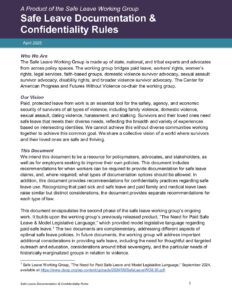Today, Esperanza United announces the release of “Safe Leave Documentation and Confidentiality Rules.” This new resource is the second product of the Safe Leave Working Group, of which Esperanza United is a proud member. The document is a resource for policymakers, advocates, and stakeholders that provides recommendations for when and how workers can be required to provide documentation for safe leave claims, along with recommendations for confidentiality practices regarding safe leave use.
The impact of violence extends far beyond the home, often jeopardizing a survivor’s employment and financial stability. A survivor may need time off to obtain a protective order, but fears losing their job for missing work. Others might endure workplace harassment, but are fearful to report. Parents seeking safe housing may be forced to choose between their safety and their paycheck. Too often, survivors must navigate all of these barriers at once.
The lived realities of many Latin@ survivors underscore why paid safe leave is so critical. Abusive partners often control finances deliberately by hiding survivors’ driver’s licenses, making false accusations to employers to sabotage job interviews, and deliberately lying about childcare pickup times to cause workplace absences.
At Esperanza United, we believe that no survivor should be forced to choose between their safety and their livelihood. Paid safe leave is not just a policy—it is a promise of dignity, confidentiality, and justice. By advocating for paid safe leave, we work to create a support system that recognizes the complex realities of Latin@ survivors.
We invite you to read the new resource, share it with your networks, and advocate for paid safe leave in your communities. Together, we can create a future where all survivors—especially those in Latin@ communities—have the freedom and support to rebuild their lives.

